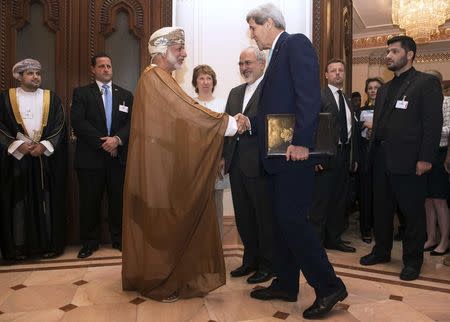Iran, West hold unscheduled second day of nuclear talks

By Warren Strobel MUSCAT (Reuters) - Iran, the United States and the European Union laboured through an unscheduled second day of talks on Monday over disagreements blocking the resolution of a confrontation over Tehran's nuclear programme, with no sign a breakthrough was at hand. With two weeks to a deadline for an overall agreement, Iranian Foreign Minister Mohammad Javad Zarif, U.S. Secretary of State John Kerry and EU envoy Catherine Ashton met in Oman to tackle a decade-long dispute which has raised the risk of wider conflict in the Middle East. Kerry and Zarif were cautious as they began an evening session of the closed-door talks at a luxury hotel. Asked whether the negotiating teams were making progress, Kerry merely replied: "We are working hard. We are working hard." Said Zarif: "We will eventually." The discussions aim to put verifiable limits on Iran’s uranium enrichment work - and any other potential path to a nuclear weapon - in return for a gradual lifting of sanctions. U.S. President Barack Obama said in a CBS television interview there was still a big gap between Iran and Western powers and said a deal could be out of reach. Economic sanctions led by the United States have pushed Iran to the table for a deal on its nuclear programme, Obama said. A final step would involve Iran providing "verifiable, lock- tight assurances that they can't develop a nuclear weapon", he said. "There's still a big gap. We may not be able to get there." Western countries suspect Iran has secretly attempted to acquire the means to build nuclear weapons. Iran says it wants peaceful nuclear energy only, but has refused to curb enrichment capacity and has been hit by damaging U.S., EU and U.N. Security Council sanctions. An editorial on Iranian Supreme Leader Ayatollah Ali Khamenei's website on Sunday made an indirect reference to a letter to him from Obama and said the U.S. president had written three such missives - in 2009, 2012 and "about a month ago". "In fact, the U.S. has always reached out to Iran when faced with an impasse and Obama's latest letter is a direct link to foreign policy dead-ends, especially those involving Iran somehow." Obama declined comment on this during the CBS interview. The toughest outstanding issues are the size of Iran's enrichment programme, the length of any final accord and the pace at which sanctions would be phased out, diplomats say. (Reporting by Warren Strobel, Parisa Hafezi and Fatma Al-Arimi, Editing by William Maclean and Gareth Jones)

